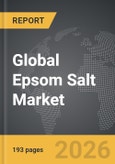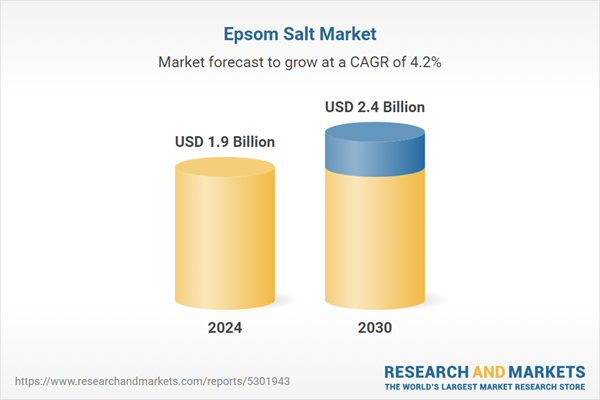Global Epsom Salt Market - Key Trends & Drivers Summarized
What Is Epsom Salt & Why Is It Valued in Wellness and Therapeutic Applications?
Epsom salt, chemically known as magnesium sulfate, is a naturally occurring mineral compound consisting of magnesium, sulfur, and oxygen. It is commonly used in a variety of wellness and therapeutic applications due to its purported health benefits. Epsom salt is typically dissolved in warm water for baths, foot soaks, or used in personal care products, where it is believed to help relieve muscle tension, reduce inflammation, and promote relaxation. Additionally, Epsom salt is used in gardening as a magnesium and sulfur supplement for plants, enhancing their growth and overall health.The demand for Epsom salt has surged in recent years, driven by the growing interest in natural health and wellness remedies. As consumers increasingly seek alternative therapies for stress relief, muscle recovery, and overall well-being, Epsom salt has gained popularity in home health and personal care routines. Its versatility in both wellness applications and gardening has contributed to its widespread use, making it a staple in many households. The combination of therapeutic benefits and natural origins makes Epsom salt an attractive option for health-conscious consumers looking for simple and effective wellness solutions.
How Does Epsom Salt Enhance Health & Well-Being?
Epsom salt is believed to enhance health and well-being through its high magnesium content, which plays a crucial role in various bodily functions. Magnesium is known to help reduce muscle soreness and tension, making Epsom salt baths a popular choice for athletes and individuals with muscle pain or stiffness. Soaking in Epsom salt can promote relaxation by easing stress and anxiety, making it a favored addition to self-care routines. The warm water, combined with the magnesium absorbed through the skin, is thought to support better sleep quality and improve mood.In addition to its muscle-relaxing properties, Epsom salt is also believed to have anti-inflammatory effects. It can help alleviate pain associated with conditions such as arthritis, fibromyalgia, and sports injuries. By reducing inflammation and promoting circulation, Epsom salt baths can aid in recovery from strenuous activities and enhance overall physical performance. Furthermore, Epsom salt's use in foot soaks has gained popularity as a remedy for tired, achy feet, providing soothing relief after long days of standing or walking. Its versatility and perceived health benefits have made Epsom salt an essential component of many wellness practices, appealing to a wide range of consumers.
How Are Technological Advancements Shaping the Development of Epsom Salt Products?
Technological advancements have significantly influenced the production, formulation, and application of Epsom salt, enhancing its appeal in various consumer markets. One key innovation is the development of more refined and high-purity Epsom salt products, which ensure consistent quality and effectiveness. Advanced processing techniques, such as crystallization and filtration, have improved the purity of Epsom salt, reducing impurities that can affect its therapeutic properties. This refinement has led to the production of specialty Epsom salt products, including flavored and scented varieties infused with essential oils, enhancing the overall bathing experience.Another advancement is the incorporation of Epsom salt in a variety of personal care and wellness products, such as bath bombs, scrubs, and gels. These formulations leverage the therapeutic benefits of Epsom salt while appealing to consumers' preferences for convenient and ready-to-use products. The rise of natural and organic personal care trends has encouraged manufacturers to create clean-label Epsom salt products that are free from synthetic additives and preservatives. Additionally, innovations in packaging, such as resealable pouches and eco-friendly materials, have improved the convenience and sustainability of Epsom salt products, attracting environmentally conscious consumers.
The integration of digital platforms and e-commerce has also transformed the Epsom salt market, allowing consumers to easily access a wide range of products and purchase them online. Social media and health blogs have contributed to the growing awareness of Epsom salt's benefits, with influencers and wellness advocates promoting its use in self-care and holistic health routines. This increased visibility has driven demand for Epsom salt and related products, expanding their market reach. These technological advancements have not only improved the quality and usability of Epsom salt products but have also broadened their applications across wellness, personal care, and home gardening sectors.
What Factors Are Driving Growth in the Epsom Salt Market?
The growth in the Epsom salt market is driven by several factors, including increasing consumer interest in natural health and wellness solutions, the rising popularity of home spa treatments, growing awareness of the benefits of magnesium, and the expanding use of Epsom salt in gardening. As more consumers prioritize their health and well-being, there is a growing trend toward using natural remedies and self-care practices that promote relaxation and stress relief. Epsom salt, with its historical use as a therapeutic agent, fits perfectly within this trend, appealing to those seeking alternative methods to manage stress, anxiety, and muscle pain.The home spa movement has gained significant traction, with consumers increasingly creating spa-like experiences in their own bathrooms. Epsom salt baths are seen as a simple and affordable way to replicate the benefits of professional treatments at home, contributing to the demand for Epsom salt products. The growing focus on health and fitness has also increased awareness of magnesium's role in muscle recovery, energy production, and overall health, driving consumers to seek out Epsom salt as a source of this essential mineral.
Additionally, the rising interest in organic and natural gardening practices has expanded the use of Epsom salt as a natural fertilizer and soil amendment, providing plants with essential nutrients like magnesium and sulfur. This trend is particularly prominent among environmentally conscious consumers looking to enhance their gardening efforts without synthetic chemicals. Emerging markets, particularly in Asia-Pacific and Latin America, are witnessing increasing disposable incomes and changing lifestyles, creating new opportunities for Epsom salt as awareness of its benefits spreads. With ongoing innovations in product formulation, expanding applications across wellness and gardening, and increasing consumer interest in natural solutions, the Epsom salt market is poised for sustained growth, driven by evolving health trends and holistic living.
Report Scope
The report analyzes the Epsom Salt market, presented in terms of market value (US$ Thousand). The analysis covers the key segments and geographic regions outlined below.- Segments: Application (Bath Care, Aromatherapy, Therapeutic, Home Care, Fertilizers, Other Applications).
- Geographic Regions/Countries:World; United States; Canada; Japan; China; Europe (France; Germany; Italy; United Kingdom; Spain; Russia; and Rest of Europe); Asia-Pacific (Australia; India; South Korea; and Rest of Asia-Pacific); Latin America (Argentina; Brazil; Mexico; and Rest of Latin America); Middle East (Iran; Israel; Saudi Arabia; United Arab Emirates; and Rest of Middle East); and Africa.
Key Insights:
- Market Growth: Understand the significant growth trajectory of the Bath Care Application segment, which is expected to reach US$798.3 Million by 2030 with a CAGR of a 3.4%. The Aromatherapy Application segment is also set to grow at 4.8% CAGR over the analysis period.
- Regional Analysis: Gain insights into the U.S. market, valued at $509.1 Million in 2024, and China, forecasted to grow at an impressive 6.1% CAGR to reach $498.7 Million by 2030. Discover growth trends in other key regions, including Japan, Canada, Germany, and the Asia-Pacific.
Why You Should Buy This Report:
- Detailed Market Analysis: Access a thorough analysis of the Global Epsom Salt Market, covering all major geographic regions and market segments.
- Competitive Insights: Get an overview of the competitive landscape, including the market presence of major players across different geographies.
- Future Trends and Drivers: Understand the key trends and drivers shaping the future of the Global Epsom Salt Market.
- Actionable Insights: Benefit from actionable insights that can help you identify new revenue opportunities and make strategic business decisions.
Key Questions Answered:
- How is the Global Epsom Salt Market expected to evolve by 2030?
- What are the main drivers and restraints affecting the market?
- Which market segments will grow the most over the forecast period?
- How will market shares for different regions and segments change by 2030?
- Who are the leading players in the market, and what are their prospects?
Report Features:
- Comprehensive Market Data: Independent analysis of annual sales and market forecasts in US$ Million from 2024 to 2030.
- In-Depth Regional Analysis: Detailed insights into key markets, including the U.S., China, Japan, Canada, Europe, Asia-Pacific, Latin America, Middle East, and Africa.
- Company Profiles: Coverage of players such as Bathclin Corporation, Baymag Inc, CVS Pharmacy, Dadakarides Salt SA, Giles Chemical and more.
- Complimentary Updates: Receive free report updates for one year to keep you informed of the latest market developments.
Some of the 43 companies featured in this Epsom Salt market report include:
- Bathclin Corporation
- Baymag Inc
- CVS Pharmacy
- Dadakarides Salt SA
- Giles Chemical
- K+ S Kali Gmbh
- Kao Corporation
- Kneipp GmbH
- L'Occitane International SA
- Parfums De Coeur, Ltd
- SaltWorks, Inc
- San Francisco Salt Company
- Shiseido Company Limited
- Stenders
- Unilever Plc
This edition integrates the latest global trade and economic shifts into comprehensive market analysis. Key updates include:
- Tariff and Trade Impact: Insights into global tariff negotiations across 180+ countries, with analysis of supply chain turbulence, sourcing disruptions, and geographic realignment. Special focus on 2025 as a pivotal year for trade tensions, including updated perspectives on the Trump-era tariffs.
- Adjusted Forecasts and Analytics: Revised global and regional market forecasts through 2030, incorporating tariff effects, economic uncertainty, and structural changes in globalization. Includes historical analysis from 2015 to 2023.
- Strategic Market Dynamics: Evaluation of revised market prospects, regional outlooks, and key economic indicators such as population and urbanization trends.
- Innovation & Technology Trends: Latest developments in product and process innovation, emerging technologies, and key industry drivers shaping the competitive landscape.
- Competitive Intelligence: Updated global market share estimates for 2025, competitive positioning of major players (Strong/Active/Niche/Trivial), and refined focus on leading global brands and core players.
- Expert Insight & Commentary: Strategic analysis from economists, trade experts, and domain specialists to contextualize market shifts and identify emerging opportunities.
Table of Contents
Companies Mentioned (Partial List)
A selection of companies mentioned in this report includes, but is not limited to:
- Bathclin Corporation
- Baymag Inc
- CVS Pharmacy
- Dadakarides Salt SA
- Giles Chemical
- K+ S Kali Gmbh
- Kao Corporation
- Kneipp GmbH
- L'Occitane International SA
- Parfums De Coeur, Ltd
- SaltWorks, Inc
- San Francisco Salt Company
- Shiseido Company Limited
- Stenders
- Unilever Plc
Table Information
| Report Attribute | Details |
|---|---|
| No. of Pages | 193 |
| Published | February 2026 |
| Forecast Period | 2024 - 2030 |
| Estimated Market Value ( USD | $ 1.9 Billion |
| Forecasted Market Value ( USD | $ 2.4 Billion |
| Compound Annual Growth Rate | 4.2% |
| Regions Covered | Global |









